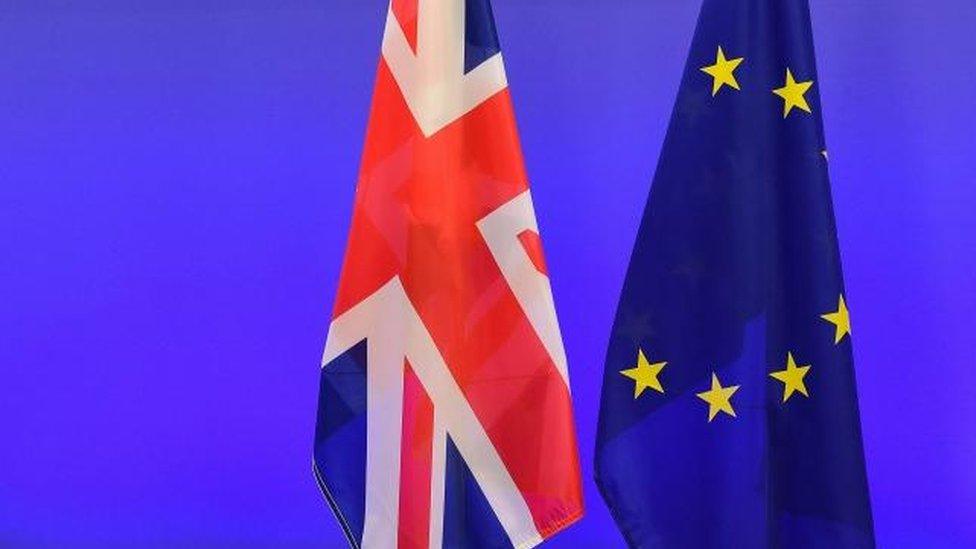Cameron ally: Don't let 'weak' Germany dictate on EU reforms
- Published
- comments
Howard Shore: "Britain in wonderful position to negotiate over EU treaty"
This morning two polls have been published on the knotty issue of business's attitude to the European Union and the referendum that is now expected by many to be held next year.
Taken together, they show that opinions vary widely on what Britain's best relation with the European Union should be.
The first by the British Chambers of Commerce suggests that half of the business leaders it polled want to wait until David Cameron reveals the strength of the government's European Union reform package before deciding how to vote.
If there was a "leave-remain" referendum held tomorrow, the survey suggests that 63% of business people would opt to remain in the EU and 27% would vote to leave.
A much more negative view on the EU is revealed in a second poll also published this morning, funded by Howard Shore, the executive chairman of the investment firm, Shore Capital.
Mr Shore is a prominent Conservative Party donor, sponsoring the Carlton Club Dinner and the Black and White Ball, important events for Mr Cameron to tell a few jokes and replenish the party coffers.
Mr Shore is known to have the ear of the Prime Minister.
His poll of 600 small business leaders was undertaken and published by Business for Britain, a group rather more sceptical about the advantages of the UK's continuing membership of an unreformed EU.
The findings suggest that a majority of small and medium-sized enterprises (also known as SMEs) believe the EU hinders their business and would like to see Britain repatriate regulatory powers over issues such as employment law and health and safety legislation.
'Strong position'
Mr Shore told me that he expected Mr Cameron to demand substantial reforms in negotiations with other EU members.
"I'm convinced that we're in an enormously strong position within Europe today to dictate the way things move forward," he told me.
And Britain's strength - Mr Shore argues - comes just as Germany, usually considered the political powerhouse of EU negotiations, finds itself in a "weak" position.
"I'd like to see the EU climate, regulation and modus operandi change for the better for everybody in Europe," Mr Shore said.
"Because I believe the way to solve the debt crisis, to provide better public services within Europe, to get people back to work, is to deregulate, particularly within employment and health and safety legislation.
"We're in a wonderful position to renegotiate.
"Germany is weak politically.
"It's suffering a refugee crisis. It's suffering a potentially very large write-off from the Greek debt.
"It has a slowdown in Chinese exports to deal with. It has sanctions against Russia, which is having a big impact on German business.
"Angela Merkel is not in a position today to resist our demands."
And, of course, Germany's largest car manufacturer, VW, is in the middle of a major corporate scandal.
"Let's put ourselves in the eyes of the people we are negotiating with," Mr Shore said.
"It [would be] an economic disaster for Angela Merkel to walk in to a new election and say 'I lost the UK, we're going to have to pay the £12bn-a-year fiscal transfer, and by the way, we had a £30bn a year trade surplus with the UK. But now we're going to have to renegotiate our trade agreement'.
"What do you think the export lobby within Germany would think of that? So, she might say she doesn't want to cross red lines, but I believe she'll have to."

Although certainly no Europhile, Mr Shore insists that he is not instinctively against Europe - he wants a different kind of European Union.
I asked him if he agreed with those - like the Business Secretary Sajid Javid - who have said in the past that Britain has nothing to fear from an EU exit.
"Yes, I do absolutely," he said.
"The reason being that it's inconceivable in my mind that if we did leave, we wouldn't be able to renegotiate a new trade agreement that looked very similar to the old one.
"But we wouldn't be subject to all these regulations.
"I'm not saying that we should just leave Europe for purely economic reasons. All I'm saying is on pure economic grounds at the moment, I think the downside outweighs the upside.
"I think that's possible to change so it's more balanced. And then people can make a decision based on other factors as well."
And is he optimistic that Mr Cameron can push through substantial EU reforms of the type he would like to see?
"I'm a born optimist," he replied with a laugh.
"I think Britain is in a great position, our economy is the most dynamic of the major economies in Europe today."